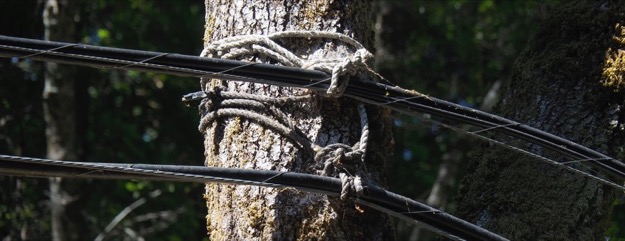
A California Public Utilities Commission decision slamming the practices of telecoms companies in rural areas – like attaching lines to trees instead of poles – and requiring carriers to notify both the commission and the state office of emergency services when significant telephone outages occur has been met with a broadly based challenge from California cable and telephone companies.
In a filing authored by Comcast lawyers and joined by Charter, Cox, small telcos, Verizon’s fiber subsidiary and lobbying fronts for the cable and mobile industries, the CPUC’s rural call completion decision was characterised as illegal on the basis of a long list of alleged procedural mistakes.
AT&T and Frontier – the primary targets of the decision – aren’t a part of this challenge and have yet to be heard from.
The big issue is whether carriers will have to report smaller telephone service outages to the CPUC than previously required, and also quickly notify emergency officials. That’s a three part problem, in the eyes of the challengers. First, they’re not completely clear about whether “carrier” applies to all phone companies, including cable companies that offer phone service, as the plain word would imply, or just to certain ones, such as traditional rural incumbents. Second, they don’t like the idea of having to tell state emergency operations centers when lines go down, because they’re used to keeping that kind of information secret and if they tell public safety officials then someone might find out the phones are out. Hey, no one would notice otherwise.
Finally, the threshold for reporting outages to the CPUC was lowered to a level that’s more consistent with rural circumstances. The previous standard was geared for large, densely populated areas and was high enough that a small rural community could be completely cut off and no report would have to be filed. The whole point of the decision and investigation behind it was to address problems that rural communities have with phone service, which doesn’t set well with companies that provide the service and, at times, cause the problems.
Usually, these kinds of challenges amount to we don’t like the decision so it’s gotta be illegal, and are typically rejected by the commission. This one might be different, though. The challengers are correct in pointing out that the process was out of the ordinary. The decision was written by former commissioner Catherine Sandoval and it was scheduled for a vote at her final meeting. Usually, when commissioners have objections to a draft decision – as some did in this case – the matter is bumped to a later meeting so changes can be made and reviewed. Instead, the document was rewritten on the fly during the meeting, and then a vote was taken, with two commissioners – Carla Peterman and Liane Randolph – dissenting.
If the CPUC rejects the challenge, it’s not likely to end there. The tone and the substance of the arguments make it clear that Comcast, Charter, mobile carriers and the rest think they’ll win if they take it to court.
CPUC decision on rural call completion issues, 15 December 2016
Coalition application for rehearing of decision on rural call completion issues, 3 February 2017
